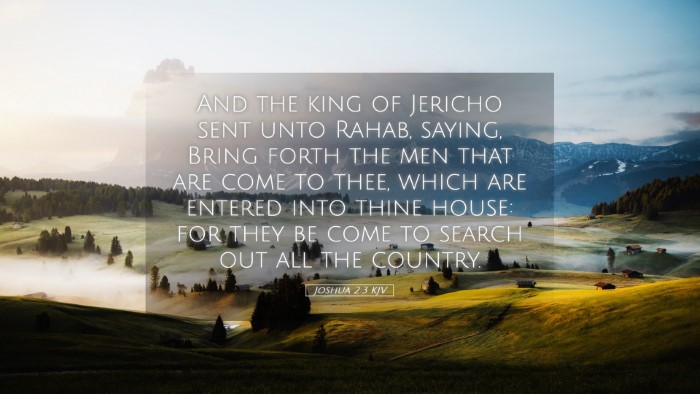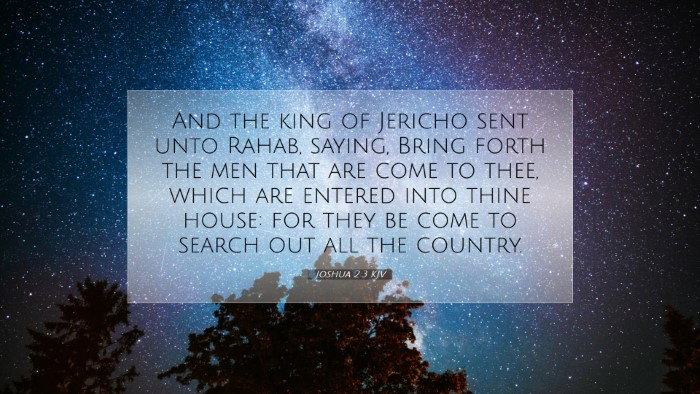Old Testament
Genesis Exodus Leviticus Numbers Deuteronomy Joshua Judges Ruth 1 Samuel 2 Samuel 1 Kings 2 Kings 1 Chronicles 2 Chronicles Ezra Nehemiah Esther Job Psalms Proverbs Ecclesiastes Song of Solomon Isaiah Jeremiah Lamentations Ezekiel Daniel Hosea Joel Amos Obadiah Jonah Micah Nahum Habakkuk Zephaniah Haggai Zechariah MalachiJoshua 2:3
Joshua 2:3 KJV
And the king of Jericho sent unto Rahab, saying, Bring forth the men that are come to thee, which are entered into thine house: for they be come to search out all the country.
Joshua 2:3 Bible Commentary
Commentary on Joshua 2:3
Joshua 2:3 states: "But the woman had taken the two men and hidden them. She said, 'True, the men came to me, but I did not know where they had come from.'" This verse presents a profound moment in the narrative of Israel's conquest of Canaan and highlights themes of faith, deception, and God's providence.
Contextual Background
In the context of the conquest of Canaan, the Israelites, led by Joshua, sent spies to scout the land, particularly Jericho. This chapter sets the stage for the miraculous entry into the Promised Land. The spies, representing the future of Israel's settlement in Canaan, are welcomed by Rahab, a harlot of Jericho, whose actions speak volumes about faith and redemption.
The Role of Rahab
Rahab's decision to hide the spies is significant. Her actions are often viewed as both brave and deeply strategic. She recognizes the power of the God of Israel and chooses to align herself with His people:
- Faith in action: Rahab's faith is evident from her immediate actions to protect the spies. Matthew Henry notes that she had heard about the miracles of God and believed, which motivated her to act.
- Historical significance: Albert Barnes emphasizes the role of Rahab as a pivotal figure in God's redemptive plan. Through her actions, she not only saves the spies but also her own family, highlighting God's ability to use unlikely people for His purposes.
Thematic Analysis of Deception
Rahab's deception in hiding the spies raises ethical questions, yet Adam Clarke suggests that her lie was an act of faith, driven by her understanding of the impending judgment on Jericho. Scholars have debated the morality of her actions, but the account underlines the complex interplay of deception for a righteous cause:
- Divine approval: Her actions lead to her being included in the genealogy of Jesus, as noted in Matthew 1:5. This underscores the idea that God can use anyone, regardless of their past, to achieve His divine purpose.
- Divine justice: The context of the Canaanite judgment illustrates that Rahab's lies are contrasted with the divine judgment against the city of Jericho. Barnes notes that her actions must be viewed within the larger framework of God's sovereignty and the established narrative of redemption.
Divine Providence and Human Agency
This verse illustrates the intersection of divine providence and human agency. The spies' successful reconnaissance can be attributed to Rahab's faithfulness. Clarke points out that the spies' mission, though fraught with danger, is enveloped in God's providential care, which includes Rahab's protection:
- Covenantal mercy: Rahab pleads for her family’s safety, exemplifying how faith can invoke God's mercy. Her plea resonates with the biblical theme of covenants and God's unwavering commitment to those who trust Him.
- Preparation for judgment: The narrative foreshadows the imminent destruction of Jericho, emphasizing the stark contrast between judgment on the city and salvation offered to Rahab, showcasing God's mercy amid judgment.
Implications for Faith and Witness
For modern-day believers, Rahab's story serves as a poignant reminder of the power of faith. Her witness demonstrates courage in the face of societal opposition and personal risk. This insight is invaluable for pastors and theologians:
- Embracing faith: Like Rahab, believers are called to take bold steps in faith, often against societal norms or personal interest.
- Witnessing effectively: The necessity of witness is paramount; creating opportunities to share faith, as Rahab did, positions one for divine favor and mercy.
Conclusion
Joshua 2:3 introduces readers to the complexities of faith, choice, and God's use of human agency within His sovereign plan. The commentary from public domain sources sheds light on the historical, theological, and moral dimensions of this verse, making it rich for pastoral teaching and personal reflection. The legacy of Rahab continues to inspire believers to trust in God's plan, regardless of their past and to act righteously amidst ethical complexities.


